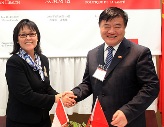
Safety Cooperation Advances on Several Fronts
Safety authorities around the world, working together in some cases, have focused recently on health issues, construction falls, hospital-associated infections, and aviation safety.
- By Jerry Laws
- Aug 01, 2009
Canada and China Renew Cooperation on Health Issues
Leona Aglukkaq, Canada's minister of Health, and Dr. Chen Zhu, minister of Health for the People's Republic of China, signed a Plan of Action on June 18 to continue the two countries' cooperation on health issues. The signing followed discussions among senior Canadian and Chinese health officials and experts on issues that included strengthening and reform of health care systems, primary health care, and food safety.
 "Canada and China have a lot to offer each other in terms of research, regulations, and expertise on health-related issues," Aglukkaq said. "The continued sharing of knowledge and insights in priority areas will contribute to the improved health and safety of citizens in both countries." Canada and China were already cooperating on regulation of health products and medical research. The new agreement broadens their work in areas of common concern, such as emerging and re-emerging infectious diseases, including influenza A(H1N1), and food safety. "China and Canada have a history of longstanding cooperation in health," said Chen. "This 2009-2011 Plan of Action is a symbol of the commitment between Canada and China to continue to cooperate on mutual health issues and challenges to ensure the better health of our future generations."
"Canada and China have a lot to offer each other in terms of research, regulations, and expertise on health-related issues," Aglukkaq said. "The continued sharing of knowledge and insights in priority areas will contribute to the improved health and safety of citizens in both countries." Canada and China were already cooperating on regulation of health products and medical research. The new agreement broadens their work in areas of common concern, such as emerging and re-emerging infectious diseases, including influenza A(H1N1), and food safety. "China and Canada have a history of longstanding cooperation in health," said Chen. "This 2009-2011 Plan of Action is a symbol of the commitment between Canada and China to continue to cooperate on mutual health issues and challenges to ensure the better health of our future generations."
Great Britain Unveils New OSH Strategy
Britain's Health and Safety Executive rolled out a new occupational safety and health strategy on June 3 in a bid to bring down injury and fatality totals. The strategy isn't revolutionary, relying on two key parts of the safety equation to propel better results. Strong leadership that champions safe work and motivates workers to deliver it is one pillar of the strategy; worker involvement is another.
"We believe this strategy represents a clear statement of core principles and a sensible approach to health and safety in Great Britain," HSE Chair Judith Hackitt said. "Whilst the economic climate is difficult and the temptation for some may be to cut corners, HSE, its partners, and businesses must resolve to continue to strive to improve health and safety performance. Good health and safety is good business."
The strategy is outlined in video and printed materials, including posters and a brief strategy document that lists 2007-08 statistics and explains why the strategy was undertaken. These include 2.1 million self-reported illness cases and 563,000 new illness cases; 2,056 deaths from mesothelioma, a cancer caused by asbestos exposure; 229 worker fatalities; 136,771 reported employee injuries and 299,000 self-reported injuries; and 34 million lost work days. Comparable U.S. statistics are far higher in most cases, with about 5,000 U.S. workers dying on the job in an average year and employee injuries estimated at approximately 4 million per year. Hackitt said the strategy was finalized after a three-month consultation with stakeholders. "During the consultation, we spoke to many interested parties and individuals, including business leaders, industry representatives, trades unions, parliamentarians, employees; and others in the health and safety system. We wanted to hear ideas on how we could all become 'part of the solution,' " she said. "The overall feedback we received was very supportive. We listened to suggestions made during the consultation and made sensible and useful changes to our original draft, to produce the version launched."
HSE Steps Up Construction Falls Enforcement
Falls from heights are the leading cause of workplace deaths and one of the leading causes of major injuries in Great Britain, according to HSE, which stepped up its enforcement and outreach on fall hazards as several prosecutions took place in early summer.
One prosecution involved a carpenter who fell more than 15 feet while working on the construction of a new school. Including a fine, costs, and compensation ordered to be paid to the worker, the London-based employer was assessed £27,796, equal to about $45,380. A second prosecution involved the case of a contractor's fall while working on the roof of Terminal 1 at Heathrow Airport, and a third involved a worker who died in a three-meter fall down an exhaust shaft during construction of an apartment project in Scotland. The home building company pleaded guilty to breaching Section 2(1) of the Health and Safety at Work etc Act 1974 and was fined £5,000 ($8,100), and a director and site manager for the company, was fined £4,000 ($6,500) after pleading guilty to breaching Section 37(1). This was only the second successful prosecution of a company director in Scotland in six years for a breach of health and safety legislation, HSE reported June 8.
For more HSE information about working at heights, visit these sites:
http://www.hse.gov.uk/falls/index.htm?ebul=cons/jun09&cr=4
http://www.hse.gov.uk/shatteredlives/construction/index.htm?ebul=cons/jun09&cr=5
http://www.hse.gov.uk/falls/roof.htm?ebul=cons/jun09&cr=6
EASA, FAA Promise Aviation Safety Cooperation
The challenge of improving aviation safety during a global recession requires the cooperation of all aviation players, the European Aviation Safety Agency (EASA) and the Federal Aviation Administration agreed as they stressed cooperation during the Europe/US International Aviation Safety Conference, which took place June 2-4 in Athens, Greece. About 300 international aviation experts representing the International Civil Aviation Organization (ICAO), the International Air Transport Association (IATA), and other organizations discussed possible improvements, achieving a more harmonized implementation of rules, and eliminating global disparities.
"Together with the FAA, we have put together an agenda that addresses the impact of the current economic situation on the aviation sector," said Patrick Goudou, EASA's executive director. "We have learned from our day-to-day business with the industry that new regulatory approaches are needed to help the sector better address this challenging situation without compromising safety." Workshops focused on airworthiness, interoperability, operations, fuel tank safety, repair stations, safety management systems, and more. Next year's conference will take place in the United States. For more information about this year’s conference, visit www.easa.europa.eu/conf2009.
The CEO of Hong Kong's Cathay Pacific Airways, Tony Tyler, began his one-year term as chairman of the IATA Board of Governors on June 9 as IATA concluded its 65th Annual General Meeting in Kuala Lumpur, Malaysia. Giovanni Bisignani, the association's director general and CEO, announced June 8 in his "State of the Air Transport Industry" speech that all 226 member airlines had completed their IATA Operational Safety Audit as required; the association in 2006 agreed to make the audit a requirement of membership beginning Jan. 1, 2009, with a 90-day grace period from that date.
Japan Issues 2009 Imported Foods Monitoring, Guidance Plan
The Department of Food Safety in Japan's Ministry of Health, Labour and Welfare (MHLW, www.mhlw.go.jp/english/index.html) has issued its FY2009 monitoring and food sanitation guidance plan to quarantine stations, basing the plane on MHLW’s Notification No. 301 of 2003.
The plan addresses foods, additives, equipment, containers, and packaging. The department also announced it has expanded inspections at the time of import of items on Japan’s Positive List system, which generally prohibits sales of food products containing residual agricultural chemicals (including drugs for animals and feed additives) above prescribed limits, and said it would request that sanitary measures be promoted during production and processing stages in exporting countries. About 32.3 million tons of foods, additives, equipment, containers, packages, and toys are imported annually into Japan, according to 2007 data reported by the ministry.
Hospital Infections Higher in Wards with Stressed Staffs, FIOH Finds
A recent study by the Finnish Institute of Occupational Health and Turku University Hospital showed hospital-associated infections (HAIs) among patients are more common in wards where staffers report a high level of work stress, problems in collaborating, and long work hours. HAIs are a significant problem, with the Joint Commission, CDC, Association for Professionals in Infection Control and Epidemiology, Inc., the Society for Healthcare Epidemiology of America, the World Health Organization, and other organizations working together to promote hand hygiene by health care workers as a primary infection control measure. The Joint Commission released its "Measuring Hand Hygiene Adherence: Overcoming the Challenges" monograph in April 2009 to help health care organizations improve in this area.
The Finnish study involved 1,092 patients, 9 percent of whom had hospital-associated infections. High work stress among staffers in the surveyed units was found to be associated with a 2.5-fold probability of hospital infection, poor trust among ward personnel with a 2.4-fold probability, an unequal distribution of work with a 1.8-fold probability, and problems in collaboration between ward supervisors with a 2.5-fold probability of hospital infections among the patients. Longer working hours among ward staffers were related to a 2.7-fold probability of infection. "Our study shows an association between poor psychosocial working conditions in hospital ward and hospital infections among patients. However, we cannot conclude whether working conditions cause infections among patients or whether high prevalence of infections among patients cause high stress, problems in collaboration, and extended work days among the staff. However, we are convinced that it is important to invest efforts both to the prevention of hospital infections and to the development of personnel well-being," said the leaders of the study, Marianna Virtanen and Professor Mika Kivimäki from the Finnish Institute of Occupational Health.
On June 8, the Joint Commission began taking comments on proposed accreditation requirements that are intended to ensure hospitals employ effective communication, cultural competence, and patient-centered care to boost both safety and quality of provided care. At the earliest, the requirements would be implemented in January 2011, according to the Joint Commission.
EMSA Opens New Headquarters in Lisbon
The European Maritime Safety Agency (EMSA, www.emsa.europa.eu/) opened a new headquarters building in June in downtown Lisbon, Portugal, naming the building's conference center in honor of Loyola de Palacio, former vice president of the European Commission in charge of relations with the European Parliament, energy, and transport. Speakers at the opening ceremony included Willem de Ruiter, EMSA’s executive director, and Mario Lino, Portugal's Minister of Public Works, Transport and Telecommunications, with a two-hour conference on maritime surveillance following their remarks. Keynote speakers included Antonio Tajani, vice president of the European Commission, and Rear Admiral Brian Salerno, U.S. Coast Guard assistant commandant for Marine Safety, Security, and Stewardship.
IEA Electing Officers This Month at Beijing Council Meeting
This month's meeting of the International Ergonomics Association's Council takes place in Beijing, China, in conjunction with the 2009 IEA Congress, which is set for Aug. 9-14. The overall meeting is hosted by the Chinese Ergonomics Society and the Congress’ program will feature more than 1,200 presentations organized in 42 tracks, IEA President David C. Caple noted in his May 2009 newsletter. IEA members will elect their new president, secretary general, and treasurer during the council meeting.
IEA (www.iea.cc/) has formed a Visual Ergonomics Technical Committee, chaired by Professor Magne Helland of Norway, to focus on topics that include visually demanding work tasks, workstation design, and illumination. The Ergonomics in Manufacturing TC’s chair is Professor Hwang Sheue-Ling of Taiwan. Also taking place this month is the 19th International Symposium on Shiftwork and Working Time Health and Well-being in the 24-hour Society, which will take place Aug. 2-6 in Venice, Italy. Visit www.shiftwork2009.it/general/page0_1.asp?pagnum=0 for information.